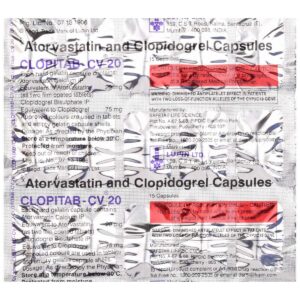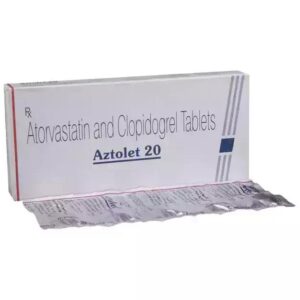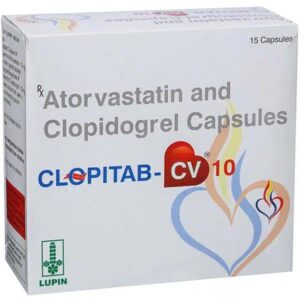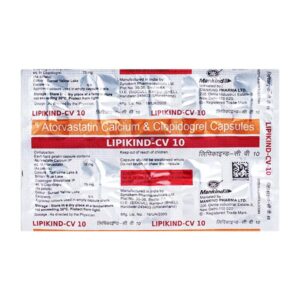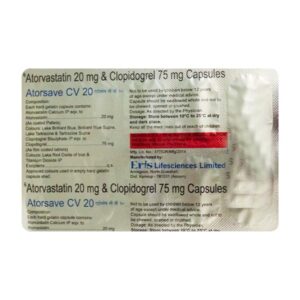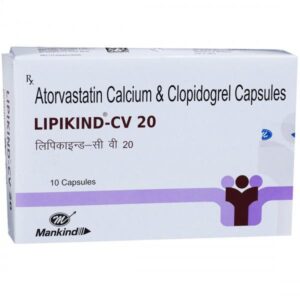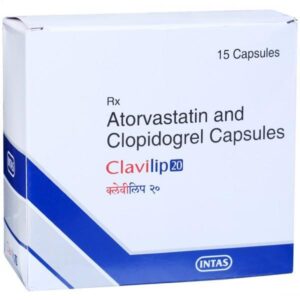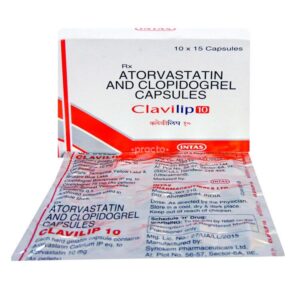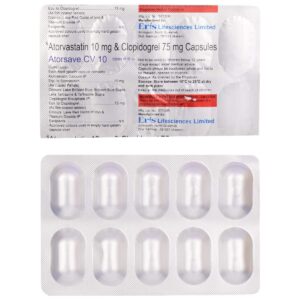CLOPIDOGREL + ATORVASTATIN
Clopidogrel: Clopidogrel is a medication commonly known by the brand name Plavix. It is an antiplatelet drug that is used to prevent blood clots.
Clopidogrel works by inhibiting the ability of platelets to stick together and form clots. It achieves this by blocking a specific receptor called P2Y12 on the platelet surface. By preventing platelets from aggregating, clopidogrel reduces the risk of blood clots forming in blood vessels, thus helping to prevent heart attacks, strokes, and other cardiovascular events.
The usual dose of clopidogrel for most conditions is 75 mg taken orally once daily, with or without food. However, the dosage may differ based on individual circumstances as determined by a healthcare professional.
As with any medication, clopidogrel can have side effects. Common side effects include bruising, bleeding, or prolonged bleeding from cuts, nosebleeds, stomach pain, diarrhea, and indigestion. It is important to contact a healthcare provider if any of these side effects become severe or persistent.
Rare but serious side effects of clopidogrel may include severe bleeding, which may require medical attention. Additionally, some individuals may experience an allergic reaction to this medication. Symptoms of an allergic reaction include rash, itching, swelling, severe dizziness, and difficulty breathing. In the event of an allergic reaction, immediate medical attention should be sought.
It is worth noting that clopidogrel does carry a risk of bleeding, therefore individuals who are scheduled for surgery or dental procedures should inform their healthcare provider about their use of this medication in advance.
Overall, clopidogrel is a widely prescribed medication that effectively reduces the risk of blood clots and associated cardiovascular events. As with any medication, it is important to follow the recommended dose and consult a healthcare professional for any concerns or questions.
Atorvastatin: Atorvastatin is a medication primarily used to lower cholesterol levels in the blood and reduce the risk of cardiovascular events such as heart attacks and strokes. It belongs to a class of drugs called statins.
The main mechanism of action of Atorvastatin is to inhibit an enzyme called HMG-CoA reductase, which plays a central role in cholesterol synthesis. By inhibiting this enzyme, Atorvastatin reduces the production of cholesterol in the liver, leading to a decrease in blood cholesterol levels.
Typically, Atorvastatin is prescribed as a daily oral dose, which may vary depending on the patient’s condition and response to the medication. The usual starting dose is 10 or 20 mg per day, but doses can range from 10 to 80 mg per day.
Common side effects of Atorvastatin may include headache, muscle pain, joint pain, diarrhea, constipation, and nausea. In rare cases, more serious side effects such as liver problems, muscle damage, and allergic reactions can occur. It is important to consult a healthcare professional if any unusual symptoms are experienced.
Atorvastatin is generally well-tolerated and has been proven to effectively reduce cholesterol levels and cardiovascular risks. However, it is essential to follow the prescribed dosage and to regularly monitor liver function and cholesterol levels while taking this medication.



